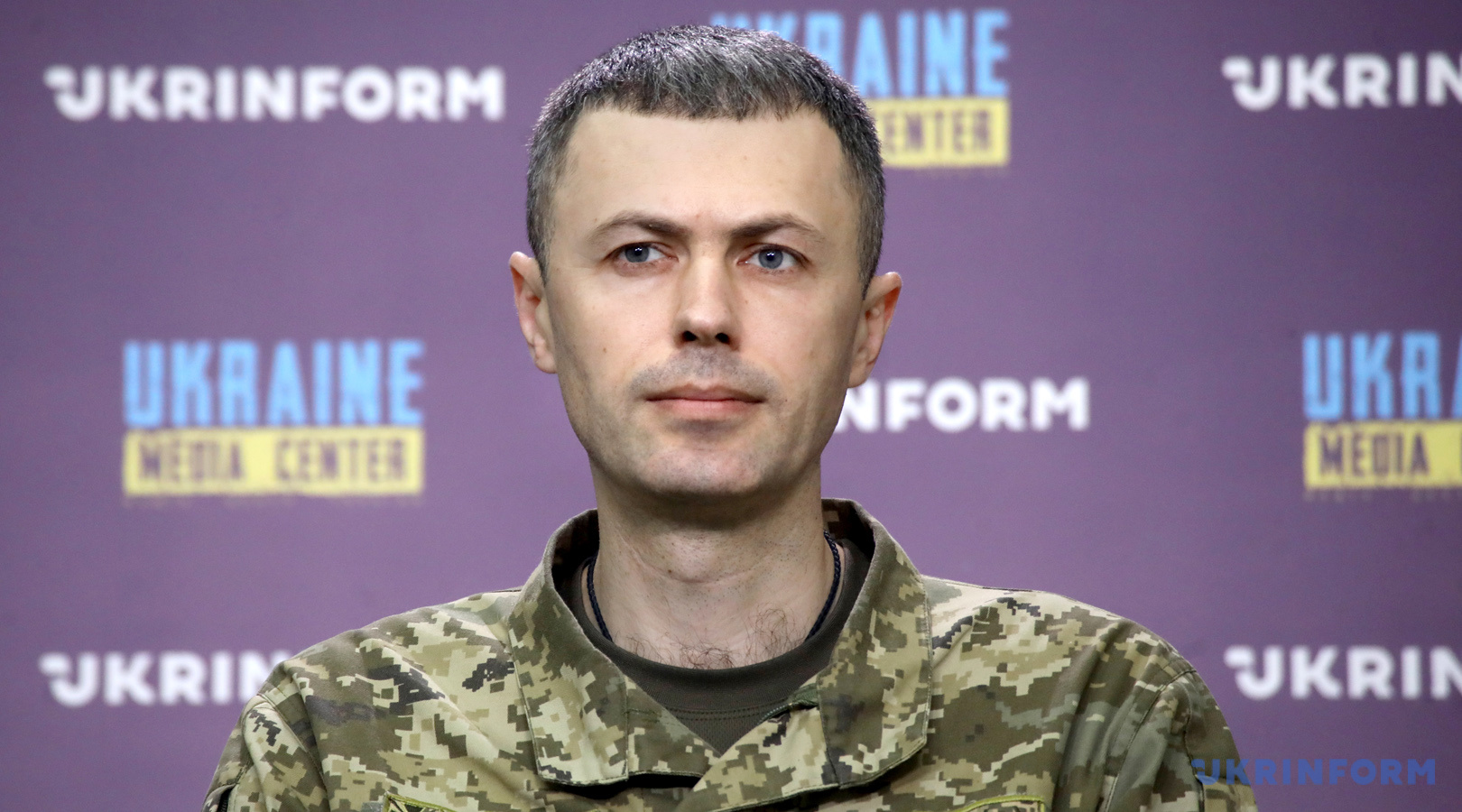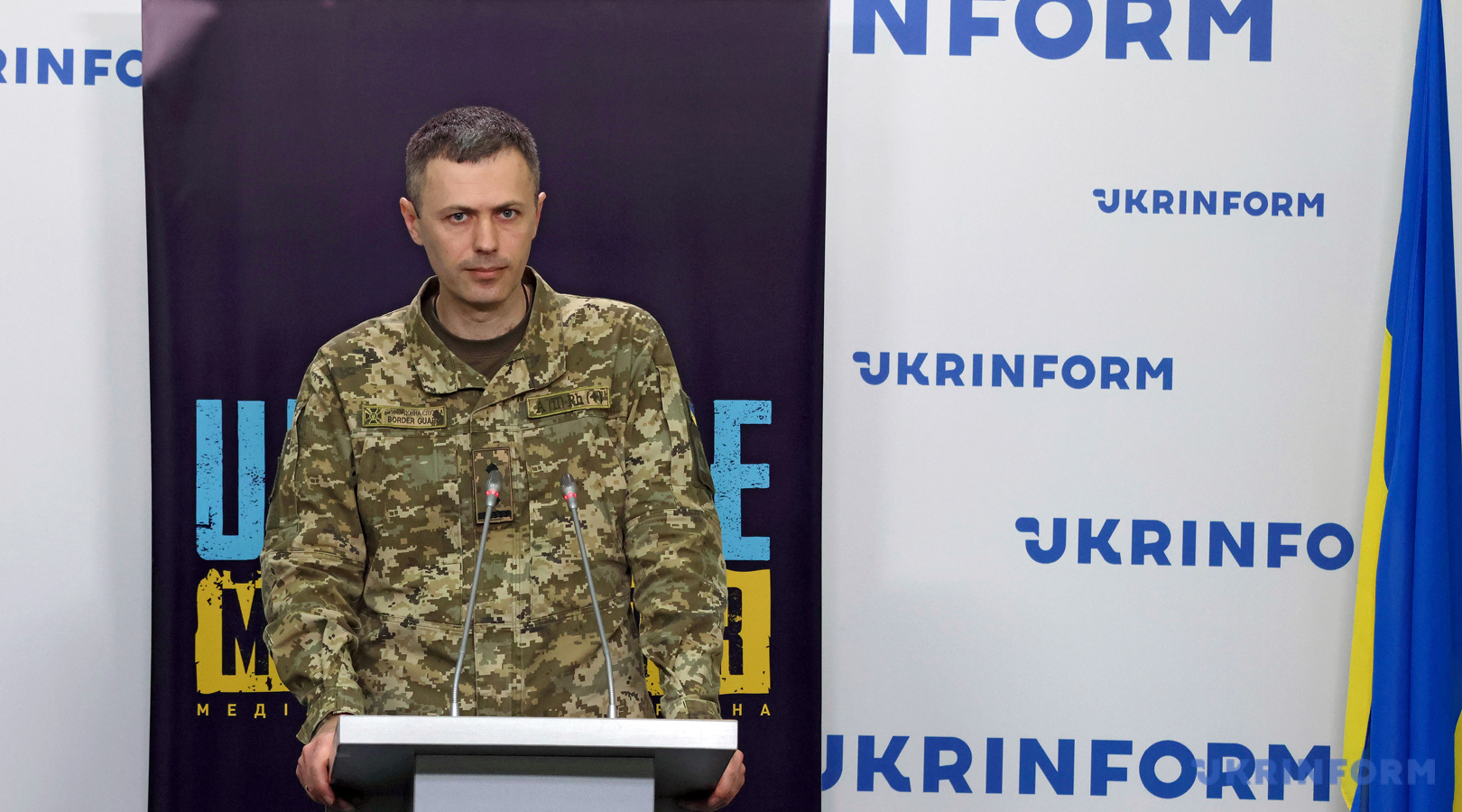April 30 marks Ukrainian Border Guards Day. This is another such day celebrated amid ongoing Russia’s war in Ukraine, and it’s only reasonable that some topics of significance have to remain under the seal of secrecy. On the eve of the Border Guards Day celebrations Ukrinform managed to meet and talk with Andrii Demchenko, an aide to the chief of the State Border Service of Ukraine - press secretary of the Service, about issues related to border security, detection and defeat of hostile subversion and recon groups (SRGs), detention of persons liable for compulsory military service during attempted escape from the country, as well as the border guards’ heroic service at the Front.
- Mr Andrii, currently, there are many rumors circulating about a potential enemy offensive expected in the Summer. What are your thoughts about this, and what’s the border security situation like now?
- The border with Belarus, like the border with Russia, remains a challenging area. Currently, Russia doesn’t deploy any significant forces or weaponry there. Intelligence units are monitoring what’s happening along the border with Belarus. We keep the situation under control so that to be able to respond in due time to any threat that can arise there. But we are not sitting idly by, we are tightening that portion of the State border that stretches from Volyn to Chernihiv Oblast.
- Can the fortifications built along that portion of the state border stop enemy forces in the event of an attack?
- Enemy forces can be stopped by nobody except Ukrainian soldiers. Fortifications can’t stop the enemy by themselves. Of course, fortifications and engineering barriers do play a significant role; this is about the protection of personnel and the ability of conducting military operations. And, of course, this is about the measures that allow us to destroy the enemy even on the approaches.

- What is the situation like on the border with the Russian Federation?
- The situation there is totally different from what we see on the border with Belarus. Regions bordering Russia are facing shelling attacks on a daily basis, and the adversary’s subversion and recon groups penetrate into those regions all the time. Thus, hostile SRGs began their raids on Chernihiv Oblast in early 2023, and then the scope of such raids expanded to include Sumy Oblast. At the end of last year, a significant hostile activity was also observed in Kharkiv Oblast. For the time being, the adversary’s SRGs are most active in Sumy Oblast.
One of our border guard patrols a few days ago reported an attempted penetration by an enemy SRG numbering over 10 individuals. They sought to place landmines on border roads, probably aiming to harm the Defense Forces or local residents.
That group was searched out and exposed, and a gunfight began. The enemy, under pressure from our border guards, was forced to retreat back across the borderline. Fortunately, none of our guys died in this engagement.
As regards a potential enemy offensive, the enemy currently does not have sufficient capabilities for launching a fully fledged invasion that would enable it to achieve any of its strategic objectives. This could be a diversionary maneuver aimed at getting us to keep our forces in near the border locations and prevent them from being redeployed to frontline areas that are currently the scene of all-out combat.
- Is there any periodicity in the adversary’s SRGs penetrating into Ukraine’s territory?
- It is not every day that attempted penetrations by hostile SRG’s are effectively searched out and exposed. They don't do so on schedule. But a certain periodicity is there. This can happen once or twice a week.
- What’s the situation like regarding the persons liable for compulsory military service trying to illicitly cross the border? How many of them died trying to cross mountain rivers and mountains?
- It is surprising that people are ready to pay large sums of money without knowing personally the individual they are paying to. They receive some instructions, transfer their money somewhere, in fact, paying for the instructions. And then they are faced with the fact that the route runs along a mountain river. Then the tresspassers are surprised that they’ve paid the money, were promised assistance, and when they reached the border line, they found that they would have to swim a mountain river and many understood they do not have enough strength for this. And that is why someone had lost his life when trying to cross a mountain river or mountains. In total, about 30 people have since the beginning of the full-scale invasion died trying to cross the border illegally. These impediments aside, there can be encounters with wild animals in the mountains, which can be seriously life-threatening.
Attempted illegal border crossings occur on a daily basis. Most of such attempts are reported to take place outside the checkpoints on borders with Moldova and Romania, while the largest amount of forged documents is reported to be found on the Polish border. Most tresspassers are not acting by themselves but use middlemen’s services.

- How many criminal groups making money on draft dodgers have been exposed?
- Some 450 criminal groups specializing in illegal transportation of people across the border have been exposed since the martial law regime had been declared.
- Now that the new "Oberih" system has been introduced, does it help you in your work?
- Beginning in March this year, information exchange has been established between the database of the State Border Service and the unified electronic register of conscripts, persons liable for military service and reservists, known as Oberih. We can now check online the authenticity of the documents issued by territorial centers for recruitment and social support (TCRSS). Because there were lots of forged documents supposedly issued by TCRSS’s, which declared a person unfit for military service. With this system in place, it has become much easier to check documents for authenticity and validity.
- What’s the situation like with respect to leaving the country using the "Shliakh" system; has the number of lawbreakers leaving under this scheme fallen down?
- Every day we deny some 120 individuals permissions to cross the border. A large number of the denials arise from the "Shliakh" system (translated as “Path” in Ukrainian, this is an e-system to register those auto drivers and volunteers who can leave the country and have an obligation to come back – ed.), particularly in cases where individuals cannot prove the purpose of their trip to a foreign country. The number of such individuals did not decrease from last year. The "Shliakh" system allows exit for auto drivers involved in county-to-country transportation of goods and passengers. This applies also to persons exiting Ukraine to accompany shipments of humanitarian aid intended for Ukraine’s population, the Armed Forces and public security institutions. Even if an individual is registered in the "Shliakh" system as liable to leave the country and holds appropriate documents issued by state authorities, but cannot prove the purpose of the trip, he is anyway denied a permission to leave.
- What do you personally remember most about border incidents involving men attempting to cross the border illegally?
- At the beginning, the biggest surprise was when men disguised themselves by wearing women's clothes or got themselves hidden in baby boxes. Later on, this began to be perceived as commonplace. But I personally remember a case where a man got hidden himself in a vehicle’s spare wheel niche. In order to fit in there, he had to strip down to his underwear. The driver was a foreign-national female. The man was subjected to a civil enforcement action, but the female driver is now facing criminal charges.
There was another case where some features of a vehicle’s design were exploited. In this case, a partition was made in a minibus, and while the border guards were checking the cargo compartment, the exit seekers ran into and hid themselves in the passenger compartment; and once the border guards proceeded to the passenger compartment, the men ran to hide in the cargo compartment. That is, illegal exits are meticulously prepared for, because this is where considerable amounts of money are involved. And when you see all these attempts to leave Ukraine illicitly, it becomes sad. Lawbreakers spend the money that enrich criminals; the money would better be donated to the units of the defense forces that are defending Ukraine at the cost of their own lives.

- The Verkhovna Rada has passed a law increasing the strength of the State Border Guard Service by 15,000 servicemen. What are the plans the State Border Guard Service has in this regard?
- Increasing the number of border guards is the requirement of the day. The State Border Service is working, enhancing its current capacities and capabilities and setting up new ones, particularly by organizing additional brigade-size units; that is, the units capable of carrying out combat missions, armed with artillery and other capabilities for use against enemy equipment. This is therefore what necessitated an increase in the number of SBSU personnel, because in the future these units will be guarding the state border. This is going to be a new pattern of border guarding, totally different from what it was previously. It will be a fully fledged military component. Currently, two brigades have been formed, named Border of Steel and Pomsta (translated as “revenge” in Ukrainian – ed.), which are already engaged in active combat operations on the front line, and we continue increasing the number of such units within the SBSU’s structure. While new units are being organized, it’s only reasonable that the strength of SBSU’s staff is growing. These units will take control of the State border once we get access to our internationally recognized border in its full length. In any case, there is going to be a completely new pattern of border guarding, or, rather, border defense. Border guards will, as before, remain on the first-line of border defense, so they must have appropriate capabilities for effectively fighting off enemy attacks should they occur.
Border guards remain an integral part of our country’s Defense and Security Forces. The scope of their tasks is pretty wide, ranging from border control checks on the western border and the Moldovan border, to supporting security in intense frontline combat areas. The only thing we wish on Border Guards Day, as on any other day, is victory over the enemy, that peace come to our land, and the border guards return to their peace-time work.
We are approaching that day, we are seeking it, and leaders of our State and of our Service are doing their best for this to happen.
Interviewed by Yanina Lemeshenko
